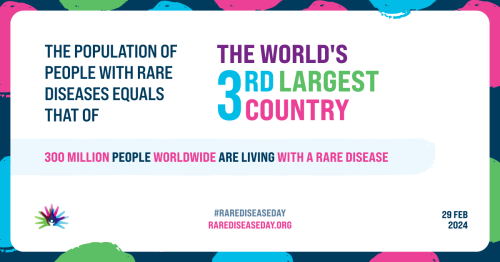The Importance of Rare Disease Day
Rare Disease Day, an annual event held on the last day of February (the rarest day of the year, which is why it was selected), stands as a beacon of unity and empowerment for individuals and families impacted by rare diseases worldwide. It serves not only as a platform for raising awareness but also as a catalyst for driving meaningful change rooted in the values of equity and inclusion.
At its core, Rare Disease Day embodies the spirit of solidarity, bringing together diverse voices from across the globe to shed light on the challenges faced by those living with rare diseases. It serves as a reminder that regardless of geographical boundaries or cultural differences, we are all part of a shared human experience, united by our common struggles and aspirations.
Equity and inclusion lie at the heart of Rare Disease Day’s mission, emphasizing the fundamental principle that every individual, regardless of their background or circumstances, deserves equal access to diagnosis, care, treatment, and social justice. By championing these values, Rare Disease Day seeks to break down barriers and ensure that no one is left behind in the journey towards improved health and well-being.
Moreover, Rare Disease Day fosters a sense of belonging and empowerment within the rare disease community, empowering individuals to share their stories, advocate for their needs, and connect with others who understand their experiences. It celebrates the resilience and strength of patients, caregivers, and advocacy organizations, inspiring hope and driving positive change on both a local and global scale. All together, we stand as a testament to the power of unity and the resilience of the human spirit in the face of adversity.
The Impact of Rare Diseases on the Global Population
Rare diseases collectively impact a significant portion of the global population, with an estimated 300 million people worldwide living with a rare disease. There is more than 6000+ rare diseases and 1 in 5 cancers is rare, with 70% of genetic rare diseases starting during childhood. In addition, over 85% of people living with rare diseases mention that their condition has affected their physical and mental health.

Source: https://www.rarediseaseday.org/downloads/
Understanding and Inclusivity in Tackling Rare Diseases
My journey with rare diseases traces back to my childhood, where I grew up in a family deeply impacted by my mother’s illness. Though her condition wasn’t formally diagnosed as a rare disease, it left her unable to walk or perform daily tasks independently. Witnessing her struggles, I discovered a profound sense of empathy and a belief that inclusivity should be at the core of our lives.
Later, when I worked as Global Campaign and Digital Communication Senior Manager at EURORDIS, I got a real eye-opener about the struggles of patients and families dealing with rare diseases. I realised that sharing stories could bring people together, no matter where they were coming from. It was inspiring to see folks from all walks of life united by a common cause.
What stuck with me the most was the need to listen closely to different regions and communities. I tried to create resources that could easily adapt to their unique needs, whether they were a small local group or a global advocate or just the patients themselves or their families. It’s all about making sure everyone’s voice gets heard and making things a little easier for those facing rare diseases.
Collaboration is Key in Eradicating Rare Diseases
Eradicating rare diseases is a complex challenge that necessitates a collaborative effort involving a wide range of stakeholders, including governments, healthcare organizations, researchers, advocacy groups, and the pharmaceutical industry. Key components of this approach include initiatives such as preborn screening, which require policymakers to make courageous decisions, as well as increased allocation of resources and funding for research into rare diseases. Additionally, regulatory incentives and support for the development of orphan drugs and rare disease therapies play a crucial role in advancing treatment options and improving outcomes for individuals affected by rare diseases., We must continue to explore initiatives and advocate for equity and inclusion for people living with rare diseases. These critical collaborations will enable us to come together to find the solutions needed to help those affected by rare diseases in the best possible way.
Find out more about Rare Diseases on our Digital hub including a collection of stories, podcasts, blogposts, articles and more.





Comments
Share your opinion with us and leave a comment below!